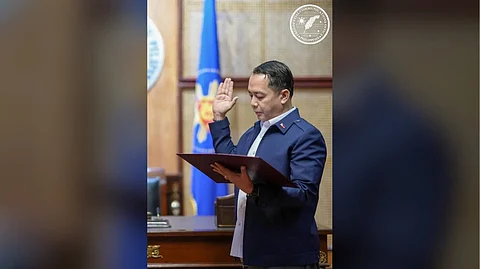
- NEWS
- the EDIT
- COMMENTARY
- BUSINESS
- LIFE
- SHOW
- ACTION
- GLOBAL GOALS
- SNAPS
- DYARYO TIRADA
- MORE

For decades, the Bureau of Customs (BoC) has served as a byword for corruption in Philippine bureaucracy, riddled with tales of bribery, smuggling, and institutionalized backdoor deals.
Despite multiple leadership changes and repeated pledges of reform, the agency has remained mired in a system many see as designed to resist accountability.
Against this backdrop, President Ferdinand Marcos Jr. recently appointed Ariel Nepomuceno as the new Customs commissioner, replacing Bienvenido Rubio.
With the new leadership came renewed promises of modernization and digitalization — key reform points also raised by Nepomuceno’s predecessor.
Nepomuceno has vowed to fully automate customs processes, eliminate human discretion in assessments and payments, and deploy artificial intelligence to weed out “ghost companies” abusing the system.
But while technology can streamline operations, it cannot override entrenched interests. For a bureau long seen as a hub of corruption, the question remains whether it can truly reform, especially under leaders who may, directly or indirectly, inherit systems that thrive on dysfunction.
This is the challenge Nepomuceno now faces: to dismantle what many describe as an agency designed not to be fixed.
Held hostage
Selwyn Lao, a longtime importer of construction machinery and materials shared his recent ordeal navigating what he described as systemic corruption inside the BoC.
Expecting a routine clearance of container homes imported from China, he said he was instead met with unexplained delays, informal payment demands, and conflicting messages about his company’s status.
He said he paid P240,000 in so-called “SOP” fees — an unreceipted payment to push transactions forward.
Commonly referred to as “lagay,” these payments are typically framed as tokens of gratitude. In this case, however, payment was demanded before any service was rendered — before clearance, paperwork, or even access to the shipment.
The importer said his broker initially assured him the container would be released on 3 June. By that afternoon, she told him the bureau’s X-ray division had flagged the shipment over alleged undeclared items — two toilet bowls and several tiles, which he said were standard components of modular homes.
He was then informed that his company had been “red-tagged.” In customs parlance, this does not imply political subversion but denotes a “problematic” importer — often viewed by insiders as uncooperative or unwilling to engage in under-the-table arrangements.
Lao said the red-tagging stemmed from a prior transaction involving a separate broker, during which he allegedly refused repeated informal payment requests. That shipment was later seized and marked for auction.
Shifting story
To release the more recent shipment, he was told to pay a penalty of P100,000, supposedly for the alleged misdeclaration. The fine was originally P90,000, with the threat of an additional P25,000 for each day of delay if not settled by 4 p.m.
On the day he expected to retrieve the container, he said he was introduced to a woman identified only as “Sam,” who was not part of his original dealings. His broker claimed this new contact was assisting due to her “connections” within the X-ray division.
This raised red flags. If the broker was already authorized to manage the process, why involve someone else? According to the importer, Sam claimed to have negotiated the amount down from P150,000 and emphasized that payment had to go through her.
The importer said he repeatedly asked for a receipt and a clear explanation of where the money would go. He received neither. Instead, he was told by his broker that “maraming kailangang bigyan” — many people needed to be paid.
He said Sam warned him not to try using official channels to schedule a meeting or request a resolution. His broker had already been ignored, she said, and only she could directly reach key individuals inside the BoC. She insisted that everything had to be handled discreetly, as they were the ones requesting a “favor.”
